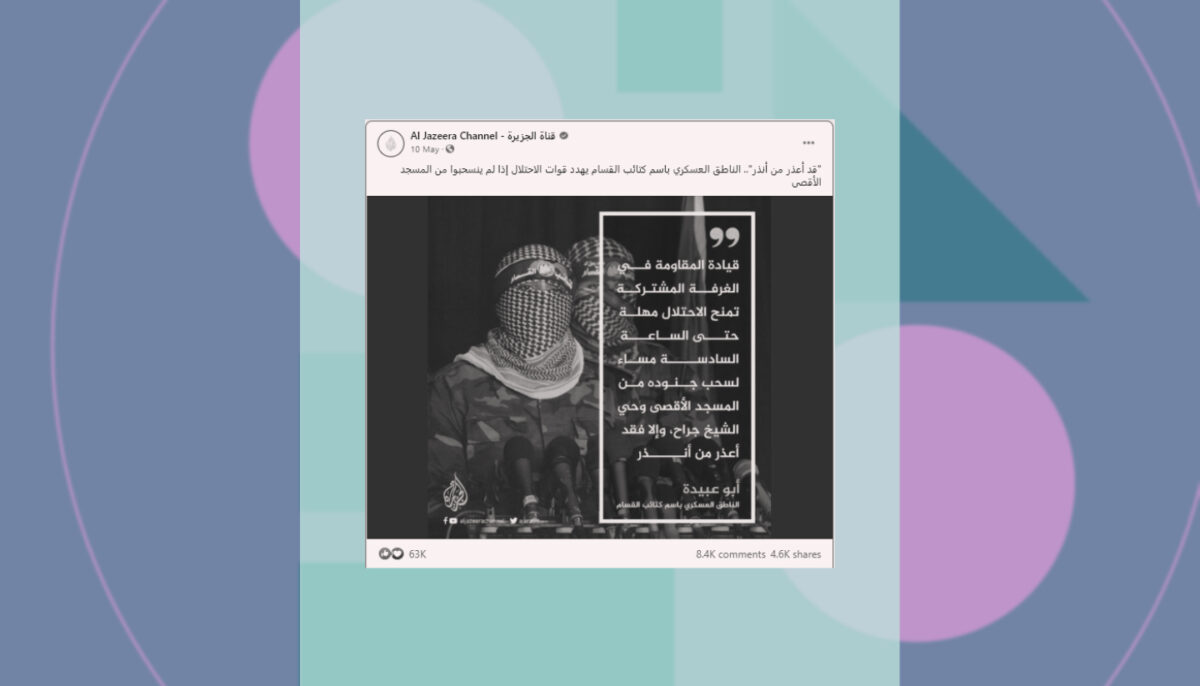On September 14, Facebook’s Oversight Board issued a decision to restore a post originally published by Al-Jazeera’s Facebook page, featuring members of Al-Qassam Brigades – Hamas’s military wing – during the latest round of Israeli aggression on Gaza last May.
“Upon reviewing case No. FB-UA-009-2021, the Oversight Board concluded that the post does not represent a violation to the Community Standards concerning ‘Dangerous Individuals and Organizations,’” stated Facebook.
Ironically, the company had claimed that “it was unable to explain why two human reviewers originally judged the content to violate this policy,” arguing that “moderators are not required to record their reasoning for individual content decisions.”
Withholding Information from the Oversight Board
What was more alarming is Facebook’s ambiguous response to the Oversight Board’s inquiry regarding Israeli requests of content takedown. The social media giant denied receiving any official requests for content removal by Israel, but it refused to comment on unofficial requests!
“Calling on the Oversight Board to audit Facebook’s practices with respect to pro-Palestinian content is a positive step and has been one of civil society’s long-standing demands,” believes Dia Kayali from Mnemonic. “Nevertheless, the Board’s unbinding decision may fall on semi-deaf ears with Facebook.” Kayali argues that “the company has been displaying a reluctant commitment to transparency – even with the Oversight Board – and has dodged the latter’s questions on the Israeli Occupation’s unofficial requests.”
SMEX’s Majd Al-Shihabi, member of an online group advocating for Palestinian digital rights, finds that the Oversight Board’s decision does not come as a surprise. “It was evident that the board would decide on the case, as this is the trivial step to take after challenging Facebook’s decision to remove content.” However, according to Al-Shihabi, the question remains: “How will the Board’s decision reflect on Facebook’s policies? And how will it be enforced?”
He expects that the company will have to make tough choices, especially when it lacks the nuanced experience needed to implement such a decision in the Arab-speaking region. Evidently, Facebook has failed to dedicate sufficient technical and financial resources to address any challenges this decision may entail.
A Futile Apology
After it had been shared by a user from Egypt with 15,000 followers, Facebook removed the post arguing that it represents an incitement to violence by Al-Qassam Brigades under the Dangerous Individuals and Organizations Community Standard. Note that it was shared during the most recent atrocities in Gaza, where Israeli carpet-bombed entire neighborhoods, killing 256 Palestinians and displacing nearly 120,000 Gazans.
In response, the Egyptian user challenged the decision and filed a complaint to the Oversight Board, forcing it to further investigate the case. It took Facebook five months to conclude that it had removed the post by “mistake” and has since then restored it. Upon examining the appeal, the Oversight Board found that the original post published by the Al-Jazeera network was never deleted, and that the news piece was of interest to the public. The Board also noted that “individuals have as much right to repost news stories as media organisations have to publish them in the first place.”
Israeli Defense Minister Benny Gantz met with Facebook and Tiktok representatives on May 15, at the peak of the Israeli aggression on Gaza. Only after news of the meeting had been leaked – causing the company major embarrassment – did Facebook agree to meet with representatives of Palestinian Authorities.
At the end of May, Facebook announced that it will establish a Special Team responsible for responding to content inquiries pertaining to the Israeli-Palestinian conflict, 24/7. It then issued an apology to the Palestinian Prime Minister Mohammed Shtayyeh “for complaints about removing Palestinian posts tackling the conflict with Israel.”
At the same time, complaints against social media channels’ bias against Palestinian voices, particularly on Facebook’s platforms, grew exponentially during the latest attacks on Gaza and the West Bank. SMEX, along with a number of human rights organizations around the world, filed a global petition and launched an ongoing campaign urging these platforms to stop silencing Palestinian voices online.
Nevertheless, in the case minutes, the Oversight Board stated that Facebook has failed to provide satisfying answers to its questions on banning some Palestinian activists’ posts.
Non-binding Recommendations and Empty Promises
The Oversight Board proposed the following non-binding recommendations to Facebook:
- “Add criteria and illustrative examples to its Dangerous Individuals and Organisations policy to increase understanding of the exceptions for neutral discussion, condemnation and news reporting.”
- “Ensure swift translation of updates to the Community Standards into all available languages.”
- “Engage an independent entity not associated with either side of the Israeli-Palestinian conflict to conduct a thorough examination to determine whether Facebook’s content moderation in Arabic and Hebrew, including its use of automation, have been applied without bias. This examination should review not only the treatment of Palestinian or pro-Palestinian content, but also content that incites violence against any potential targets, no matter their nationality, ethnicity, religion or belief, or political opinion. The review should look at content posted by Facebook users located in and outside of Israel and the Palestinian Occupied Territories. The report and its conclusions should be made public.”
- “Formalise a transparent process on how it receives and responds to all government requests for content removal, and ensure that they are included in transparency reporting. The transparency reporting should distinguish government requests that led to removals for violations of the Community Standards from requests that led to removal or geo-blocking for violating local law, in addition to requests that led to no action.”
In an appendix to case No. FB-UA-009-2021, and after Facebook had restored the deleted post based on the Oversight Board’s recommendation, the latter requested further clarifications within 30 days on the following:
- whether content removal is in line with the company’s Community Standards, its declared values, and its commitment to human rights;
- how the implementation of Facebook’s policies affects information-sharing regarding the Palestinian cause;
- and whether Facebook’s policies amount to censorship against vulnerable groups in the region.
The Board also announced that it will be receiving the public’s comments to expand perspectives and make a better-informed decision with regards to this case.
For its part, Facebook stated that “it will implement the Board’s decision as soon as deliberations are over,” without mentioning whether it will take any further action in relation to the remaining recommendations.
Unfortunately, it is unclear whether Facebook will adhere to the Oversight Board’s recommendations, as the latter are non-binding to the parent company and its subsidiaries.
Facebook continues to make empty promises to the Oversight Board, the public and human rights organizations alike. In reality, giving voice to minorities and groups in conflict-fueled regions is not among Facebook’s priorities. The numerous scandals surrounding the company, particularly in relation to the implementation of its policies, including the most recent leak of a document reporting that many public figures are exempted from relevant community standards, continue to expose the company’s double-standards and hypocritical stances.



